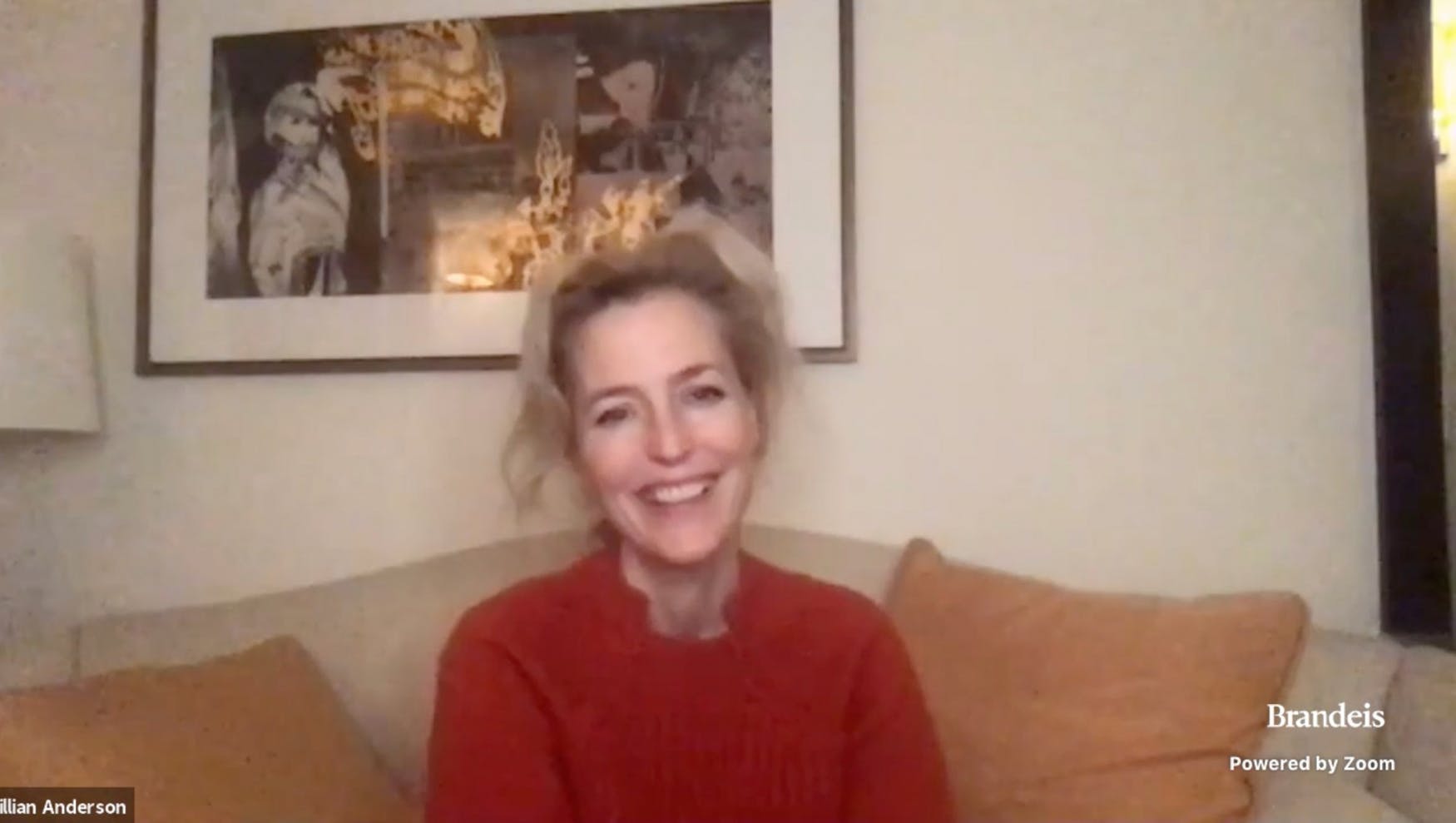Gillian Anderson shares insight on playing empowering female characters
Gillian Anderson visited Brandeis for a virtual webinar, hosted by Prof. Alice Kelikian (FILM/HIST/ITAL), to speak about the actress’s iconic roles
America’s obsession with the affairs of the British Royal Family spiked following Meghan Markle’s March 7 bombshell interview with Oprah, but it could be said that this country’s fascination was already steadily rising with the 2016 debut of the award-winning Netflix series “The Crown.” The stars of this popular Netflix series have attracted award wins each year. This year the series took home three Golden Globes — its biggest win to date. Gillian Anderson, who played British Prime Minister Margaret Thatcher on season 4, won Best Performance by an Actress in a Television Supporting Role on Feb. 28, just days before the actress spoke to Brandeis students via a Facebook Webinar on March 5.
Chair of the Film, Television, and Interactive Media program Prof. Alice Kelikian (FILM/HIST/ITAL) hosted the event, which was sponsored by the Edie and Lew Wasserman Fund, per a March 5 BrandeisNOW article. Anderson spoke to Brandeis students about what it was like to play such an important role in an already established, critically acclaimed series that chronicles the timeline of Queen Elizabeth II’s reign, unveils the intimate affairs of figures in the British monarchy and government and dives deep into crucial events within mid-to-late 20th century. She shared what first drew her to the role of Margaret Thatcher, saying, “The reasons to take on a character like [her] are many. … Actors are always looking for complex, multifaceted characters, and she’s definitely that.”
Anderson is no stranger to playing complex characters. She also plays Jean, the eccentric sex therapist mother of high-schooler Otis, on another Netflix series, “Sex Education.” She said that the joy of this role comes from playing a comedic character where she had previously not been offered many opportunities to take on comedy. “It has been fun to explore a character like Jean and really push the boundaries of what I think I could potentially do, comedically,” she said. She also told attendees that her experience with comedy is rooted in her time on “The X-Files.” “People forget, or either don’t realize, that quite a few episodes that we did were comedic episodes … written by very good comic writers.” She highlighted the comedic writers Darin Morgan, who wrote for “Millenium” and “Those Who Kill,” and Vince Gilligan, who later wrote for “Breaking Bad” and “Better Call Saul.” But the “dark” and “somewhat tongue-in-cheek kind of humor” of "X-Files" did not lead her to comedic roles until she joined “Sex Education,” Anderson explained.
The roles that Anderson has played speak to her diverse range of talent, as she embodies the very ideals that her characters represent and stand for. She has frequently portrayed feminist characters, including her role as a sex therapist on a show that advocates for female empowerment through their sexuality, as well as her role as a scientist in what is regarded as a male-dominated field. The role of the skeptic FBI scientist Dana Scully on the sci-fi series “The X-Files,” running from 1993 to 2018, was Anderson’s first call to fame. Anderson also talked about her experience playing Scully and the so-called “Scully-effect,” which saw a correlation between the rise of women pursuing STEM fields and the growing popularity of the show. “The Scully-effect was not a virus,” Anderson joked, “but perhaps it was an epidemic among young women entering the STEM subjects as a result of Scully’s presence in culture." She added, "She existed as a role model or somebody to identify with."
Anderson mentioned studies conducted in 2018 by 21st Century Fox, J. Walter Thompson Intelligence and the Geena Davis Institute on Gender in Media that showed that "nearly two-thirds of women that work in STEM say Dana Scully served as their role model," and "among women who are familiar with Scully’s character, 63% say Scully increased their confidence that they could excel in a male-dominated profession."
Anderson offered words of advice and encouragement to Brandeis students pursuing careers in the media and film industries, which still overwhelmingly lack representation for women. "There have been a lot more women directors and producers actually working in the industry now than ever before, but it is still, especially in high offices, still predominantly a male industry," she said. "We need more women writers, we need more women screenwriters, we need more women directors of photography and camerawomen."
Anderson’s roles have provided her with an impressive repertoire, but Anderson remains quite humble. At one point Kelikian commended, “You won a Golden Globe [for “The Crown”]. It was an amazing portrayal … and that’s thanks to you.” But Anderson’s response emphasized the importance of the people behind the scenes of the series who guided her throughout the process. “[The win came from] a mixture of working on it for a year beforehand, and doing a ton of research, working really, really hard on the voice and on the movement … but also a team helping with vocals, with movement, with wigs, makeup, and costumes," she said. "It takes a village.”
The Facebook webinar will not be the last time Brandesians will have the opportunity to engage with Anderson. The Brandeis community can look forward to soon watching Anderson at work on our streaming screens as the ultimate Brandeisian icon, Eleanor Roosevelt, the founding member of the Brandeis Board of Trustees, in the Showtime series “The First Lady.” Through this role, Anderson will add to her legacy of playing iconic female characters, and she will undoubtedly continue to inspire those who watch and listen to her.



Please note All comments are eligible for publication in The Justice.